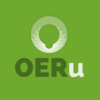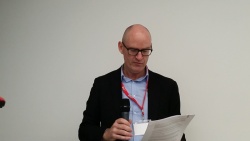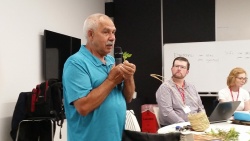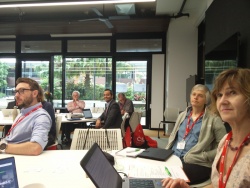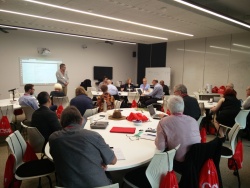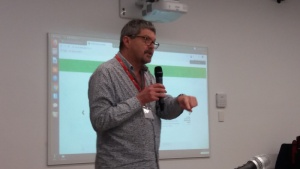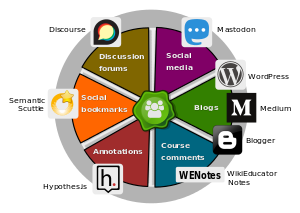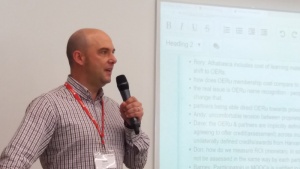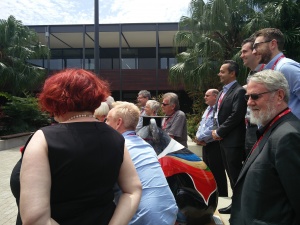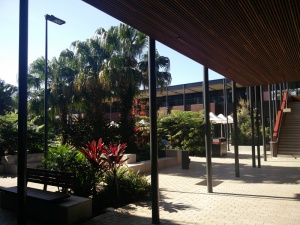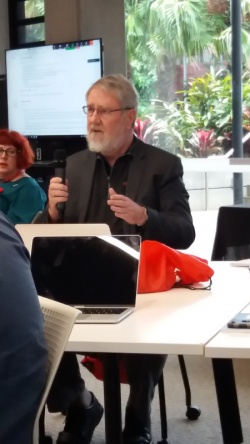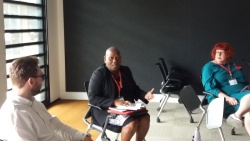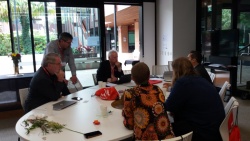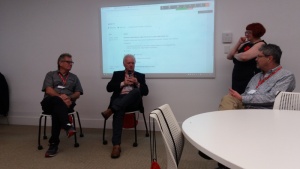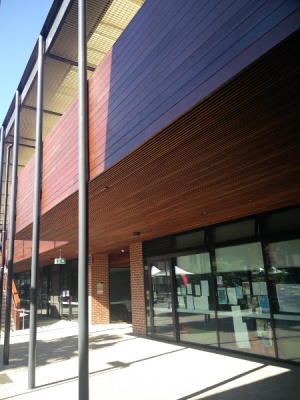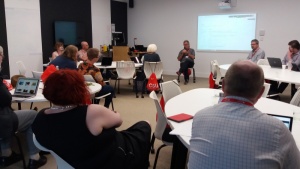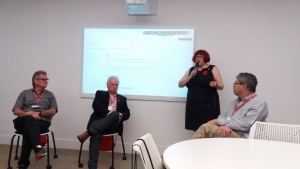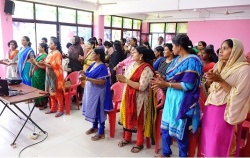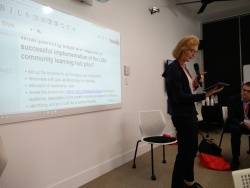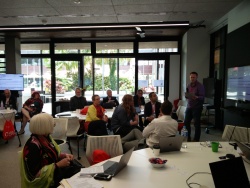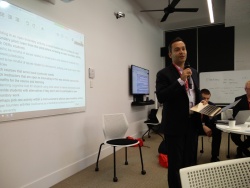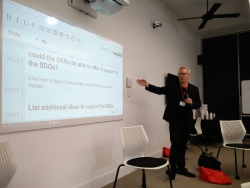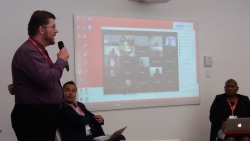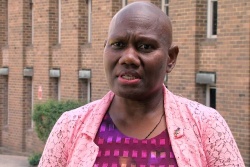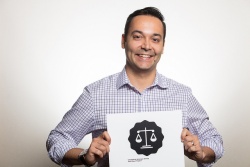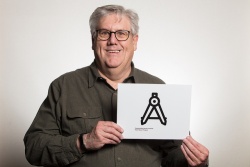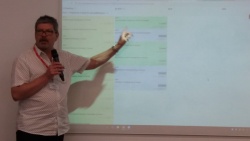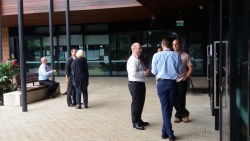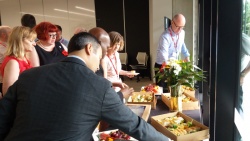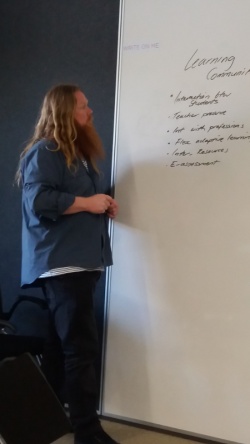OERu 18.11 partners' meeting report
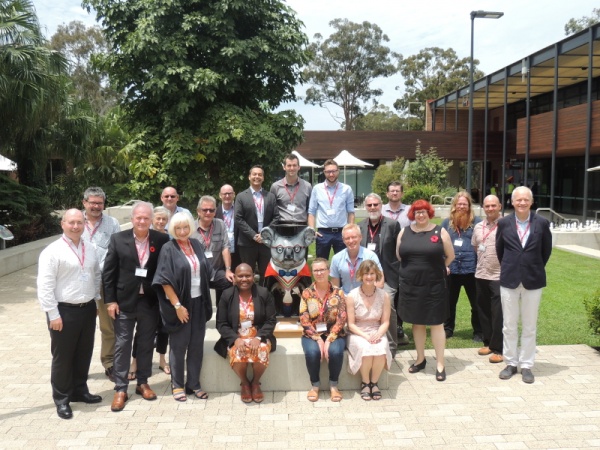
The 7th international meeting of OERu partners was hosted by the Charles Sturt University on 7 and 8 November 2018 at their Port Macquarie campus, Australia.
Participants reviewed progress with the implementation of the OERu 1st year of study and discussed the draft OERu strategic plan: 2018 - 2021.
Key outputs of the meeting included:
- Recommendations for implementing the OERu digital marketing initiative;
- Strategies to improve partner engagement in the OERu;
- Planning to trial a number of innovation pilot projects;
- Proposal to adopt the OERu strategic plan taking refinements into account;
- Recommendations to improve the collateral for OERu partner recruitment; and
- Progress on the OERu quality guidelines project.
The OERu 2019 meeting dates are confirmed as follows:
- 8th International Meeting of OERu Partners, Wednesday 30 and Thursday 31 October 2019 , Dublin
- 7th meeting of the OERu Council of Chief Executive Officers, Friday 1 November 2019, Dublin
Summary of outputs and key decisions
The summary of outputs and key decisions should be reviewed in conjunction with the detailed record (linked) of each component of the meeting agenda.
- Key priorities derived from the critical friend review, which helped to prioritise meeting discussions:
- Partner engagement and organisational capacity
- Improve partner engagement so that more member institutions contribute actively to the network and embed OERu outputs and processes within their institutions with increased support from senior leaders.
- Focus partner recruitment and engagement strategies on "return on investment" and "value propositions" of membership with OERu.
- Augment the capacity of the OERu central operations beyond a labour force of two; for example, secondments of partner staff to work on OERu initiatives or additional cash contributions.
- Promote the OERu's open source technology stack and associated operational expertise as a membership benefit that is currently undervalued, partly because many of the academics participating in meetings do not have the technological expertise to assess its real value. OERu should "productize" its open source expertise as a membership benefit or fee-for-service arrangement.
- From vision to action - show the numbers
- Demonstrate active progress through growing numbers of participants engaging in actual learning, as it is now imperative for OERu to realise its potential.
- Improve digital marketing so the learners who will benefit most from OERu offerings are aware of the learning opportunities and credentialling pathways the network provides.
- Expand the OERu network beyond the meeting attendees from higher income countries.
- Consider creating a fee-free membership category for institutions from low and lower middle income countries that can't afford OERu membership fees, and explore the potential of partnering with non-governmental organisations to assist with "marketing" to the under-served.
- Extend the OERu focus beyond "transcriptable" transfer credit to incorporate alternate forms of validation focusing on education for employment.
- Curriculum and program of study
- Improve the quality assurance of learning design and pedagogical use of digital technologies.
- Improve the OERu website to provide greater clarity of course offerings, costs and processes for gaining credentials.
- Partner engagement and organisational capacity
- Decision recommendations for improving OERu operations:
- Promote opportunities for partners to participate in the OERu digital marketing project and reduce barriers for OERu partner marketing professionals to engage.
- Table recommendations from the OERu 18-11 digital marketing session at the next meeting of the OERu Marketing and Communications Group, who will serve as the reference group for the digital marketing project grant from the William and Flora Hewlett Foundation.
- Improve partner engagement and extend the network
- Establish a Partner Engagement Task Force to be chaired by Phil Ker with CEO volunteers or nominees. This task force will:
- Survey OERu partners about engagement with OER and OERu in their institutions to identify examples of good practice and barriers to engagement.
- Develop explicit statements and examples of ROI from partnership with OERu, plus guidelines on how to maximise ROI (including associated collateral; for example case studies, videos etc.)
- Devise and (where possible) implement solutions for institutions that are not currently in a position to become paid-up members, recognising that OERu's commitment to social good is not limited to learners, but should include institutions in need.
- Establish a Partner Engagement Task Force to be chaired by Phil Ker with CEO volunteers or nominees. This task force will:
- Identify and prioritise candidate software technologies for potential partner adoption and associated community support initiatives
- Progress OERu technology recommendations taking capacity considerations into account.
- Promote opportunities for partners to participate in the OERu digital marketing project and reduce barriers for OERu partner marketing professionals to engage.
- Explored alternate credentialling options for higher education
- Decision proposals for OERu innovation pilots and improving ROI for partners
- Circulate a call for participation to OERu partners interested in collaborating on the assembly of micro-courses towards a digital accessibility program.
- Circulate a call for participation to OERu partners interested in contributing to the online proctoring innovation pilot with ProctorU.
- Implement the LiDA community learning hub innovation pilot for OERu and community libraries.
- Incorporate long-term sustainability of the OERu network as a directing theme for the 2018 meeting of Chief Executive Officers.
- Identify candidate courses offered by partners (not necessarily OERu courses) where open boundary and open pedagogy activities could be integrated, and encourage OERu course developers to promote the inclusion of these activities.
- Taking market demand into account, continue mapping OERu micro-courses to the SDGs and work with relevant groups to progress OERu micro-credentials and corresponding first year of study in sustainability.
- Hosted an open webinar: Opening doors to higher education isn’t enough: The deeper challenges of OER
- Decision proposals for OERu strategic futures.
- Approve the draft OERu Strategic Plan: 2018 - 2021 with the following amendments:
- Following consultation with partner organizations, refine the OERu mission statement contained in the strategic plan so that it drives value for member institutions.
- Expand the objectives of Goal 4 relating to achieving a fiscally sustainable and scalable OERu network to include initiatives that determine and drive value for member institutions.
- Improve partner recruitment
- Implement proposals to simplify and improve the OERu formal letter of invitation to join the network.
- Implement proposals to improve the oeru.org website relating to partner recruitment and provide relevant and compelling information highlighting the benefits of partnership.
- Approve the draft OERu Strategic Plan: 2018 - 2021 with the following amendments:
- Decision proposals to implement OERu quality guidelines.
- Circulate a call for participation to OERu partners to nominate representatives to join the OERu curriculum and quality group.
- Implement recommendations discussed at the partners meeting to develop the OERu quality guidelines toolkit with an emphasis on repurposing existing resources.
- OERu 2019 meetings to be hosted at Dublin City University as follows
- 8th International Meeting of OERu Partners, Wednesday 30 and Thursday 31 October 2019 , Dublin
- 7th meeting of the OERu Council of Chief Executive Officers, Friday 1 November 2019, Dublin
Day 1: OERu past and present
Setting the scene - Session 1
| Video recording of Session 1 | |||||||||||||||||||||
|---|---|---|---|---|---|---|---|---|---|---|---|---|---|---|---|---|---|---|---|---|---|
  | |||||||||||||||||||||
|
Valerie Peachey, Co-Director u!magine, Division Learning and Teaching, Charles Sturt University and 2018 OERu meeting host launched our international meeting. Barney Dalgarno, Acting Pro-Vice-Chancellor, Learning and Teaching, Charles Sturt University welcomed participants to the Port Macquarie campus and explained the Australian tradition of the "welcome to country" for international visitors. Uncle Bill Williams, Birpai Elder, welcomed participants to country and provided a bush tucker demonstration.
Meeting aims
Wayne Mackintosh summarised the aims of the meeting, namely to:
- Review progress with the implementation of the OERu 1st year of study
- Determine operational priorities for 2019
- Discuss the OERu strategic plan: 2018 - 2021
Participants introduced themselves and shared institutional practices and experiences in open education.
OERu milestones
Wayne summarised the milestones and key decisions of the OERu implementation:
- Assessment and Credit for Students - Open Meeting (February 2011, Dunedin): Proposal of the OERu concept, planning framework and adoption of the CIPP (Context, Input Process, and Product) evaluation model to inform implementation.
- Inaugural meeting of the OERu Founding Anchor Partners (November 2011, Dunedin): Agreed the inaugural credential (Bachelor of General Studies) and adopted a prototyping model to assemble a small number of courses to refine the OERu delivery model.
- 2nd Meeting of OERu partners (October 2013, Kamloops): Initiated the OERu working group organisational structure, and proposed a micro course structure with opportunities for gaining micro-credentials. Launch of the OERu officiated by Sir John Daniel.
- 1st Meeting of the OERu Council of Chief Executive Officers (November 2013, Kamloops): Agreed terms of reference for the Council; established the Executive Committee with representatives from Africa, Europe, Oceania and North America; and tasked the consultative development of the OERu strategic plan.
- 3rd Meeting of OERu partners (November 2014, Hobart): Approved the OERu Strategic Plan 2014 - 2017; tabled the first draft of the OERu guidelines for credit transfer; and reviewed the plan for the Input Evaluation.
- 2nd Meeting of the OERu Council of Chief Executive Officers (November 2013, Sydney): Endorsed the OERu Strategic Plan 2015 - 2017 and approved the implementation of OERu annual "Institutional Action Plans".
- Oceania and North American OERu Regional Meetings (August 2015 and September 2015, Toowoomba and Vancouver respectively): Consultation to design and develop the OERu open business model.
- 4th Meeting of OERu partners (October 2015, Vanderbijlpark): Unanimous approval of the OERu guidelines for credit transfer and credit accumulation, and decision to implement the OERu 1st year of study as a minimum viable product.
- 3rd Meeting of the OERu Council of Chief Executive Officers (October 2015, Vanderbijlpark): Endorsed proposal to implement the OERu 1st year of study and nominated the Certificate in Higher Education at the University of the Highlands and Islands as an exit credential. Expanded the Council's terms of reference to provide advice, guidance, and support on implementing the OERu.
- 5th Meeting of OERu partners (October 2016, Inverness): Confirmed the launch of the OERu 1st year of study leading to two exit qualifications: Certificate of Higher Education in Business, University of the Highlands and Islands; and the Certificate of General Studies, Thompson Rivers University.
- 4th Meeting of the OERu Council of Chief Executive Officers (October 2016, Inverness): Endorsed the decision to launch the OERu 1st year of study leading to two exit qualifications, while pursuing realistic but conservative targets as the OERu model builds brand awareness and collects data from the process evaluation to inform future decision-making.
- 6th Meeting of OERu partners (October 2017, Toronto): Proposed launch schedule for the OERu 1st year of study, rationalisation of the OERu organisational structures and commenced work on developing a digital marketing strategy for the OERu 1st year of study.
- 5th Meeting of the OERu Council of Chief Executive Officers (October 2017, Toronto): Confirmed decision to prioritise the launch of the OERu 1st year of study prior to allocating resources for the 2nd and 3rd year of study, committed to achieving a leadership role in micro-credentialling and approved the OERu risk register.
Taking stock and establishing meeting priorities - Session 2
The year in review
| Video recording of Session 2 | |||||||||
|---|---|---|---|---|---|---|---|---|---|
  | |||||||||
|
See meeting agenda for resource links
Wayne noted that with the implementation of a transnational OERu collaboration spanning five continents, "the devil is in the detail", particularly if the network aims to scale effectively to support large numbers of learners. Wayne reported on initiatives the OER Foundation undertook to prepare for the launch of the 1st year of study including: the development of a learner support site; revision of the OERu privacy policy and privacy notice to ensure compliance with the European General Data Protection Policy (GDPR) which became enforceable on 25 May 1018; and the migration to self-host Mautic (an open source marketing automation software solution) due to the SaaS pricing model becoming unaffordable for a small non-profit organisation.
Wayne shared that the OERu will implement a "perpetual academic year" meaning that each micro-course will have four offerings each year, specifically three cohort offerings with fixed start and completion dates plus an independent study offering with the option for learners to start at any time. The OERu 1st year of study leading to two exit qualifications will equate to a minimum of 240 micro-course offerings each year, highlighting the need for high levels of automation for the OER Foundation which only has two full-time staff. Wayne demonstrated how the OERu instance of Mautic will be used to automate course announcements using email campaigns, based on learner preferences expressed through landing pages. (See, for example, the course landing page for Introduction to Project Management, expression of interest for the Roles of the project manager micro-course, and associated learner preferences landing page.) Each landing page is integrated with a corresponding Mautic email campaign to ensure scalability of operations.
A week in the life of the OERu's open source technologist
See 2018 update on the OERu technology stack (Detailed summary)
Dave provided an overview of the technologies underlying the NGDLE, including the hosting infrastructure services the OER Foundation maintains around the world. The direct cost of the OERu's technology infrastructure is minimal:
Total annual software + infrastructure budget: $4800[2]
He described the thinking behind the geographic distribution of that infrastructure, some of the challenges it poses, as well as some of the opportunities, including scalability (thanks to the widespread use of Docker containers) and flexibility (moving services between infrastructure nodes to be closer to demand), as well as offering the strength of "diversifying our risk" across the world.
Dave also explained the process by which we assess new open source components and replace existing components with better ones in our "loosely coupled component-based system", and highlighted the benefits of using best-of-breed open source applications already proven at "internet scale" and how that gives the OERF confidence we can meet the foreseeable needs of our learners and partners as demand for our services rise.
Finally, Dave broke down the cost (both real and time costs) of the OERF infrastructure, which is amazingly low given its breadth and scope, including a case study of using a commercially hosted Software-as-a-Service offering (Mautic) until the vendor's pricing plan changed, making it untenable to scale as the OERu would require. The fact that this particular SaaS software is open source allowed the OERF to to bring it in-house (self-hosted) offering a vastly superior value proposition. He also pointed out that OERu partners could potentially benefit substantially (well in excess of the their OERu membership fees) simply by adopting one of the NGDLE technologies relevant to their institution's requirements (and, obviously, save still more by adopting multiple technologies).
Critical friend review
| Video recording of Session 2 Feedback | ||||||||||||||||||
|---|---|---|---|---|---|---|---|---|---|---|---|---|---|---|---|---|---|---|
  | ||||||||||||||||||
|
Participants were assigned to four groups and one virtual participant group and tasked to: identify what the OERu has done well; identify areas where the OERu can improve; and identify the top priorities the meeting should address. (Note: The consolidated feedback below has been assembled from the feedback recorded by Group 1, Group 2, Group 3, Group 4, and Virtual participant group respectively).
Summary of what OERu is doing well
- Achieving and maintaining an international network of 30+ partners from five continents.
- Clear vision to widen access to more affordable and sustainable education using open source approaches and remaining on point.
- Demonstrated excellence and feasibility of technical infrastructure based entirely on free and open source software which promotes flexibility and agility of the OERu initiative.
- OERu has demonstrated a radically transparent pathway to learning and accreditation - the network must now move it out and well beyond the core OERu partners.
- Developed a functioning system for transnational micro-credentialling and academic credit transfer towards university qualifications.
- Three institutions will be offering exit qualifications for OERu learning.
- Demonstrated best practices in global, open, and transparent partnering with excellent information sharing. (Community collaboration and transparent consultation processes are mature and transferable).
- Efficiency in operations with low overhead.
- Planning for scalability.
- Impressive list and variety of OER micro-courses assembled by the OERu with an early focus on stackable micro-credentials linked to formal academic credit.
- Linking champions in OER from institutions on a global scale.
Summary of where OERu can improve
- Improve collateral to help sell the OERu value proposition within partner institutions (fact sheets, micro-brochures, video testimonials) and corresponding strategies for creating awareness and promoting OERu with academic faculty and professional staff at our partner institutes.
- Improve strategic selection of courses for development to align development with the needs of the OERu network (including improved re-use of existing OERu courses at partner institutions).
- Improve information for learners on how to become credentialed with associated programs of study and clear information of the cost to learners (OERu needs to help learners compare options, for example, EdX presents a clear financial comparison between a 'traditional Masters' versus an EdX credential).
- For partners pursuing commercial services related to OERu programs of study, processes for ethical lead generation into paying enrolments should be discussed and implemented by the network.
- Promote strategies for attendees to stay in contact after partner meetings. Support people to overcome the threshold of registering on community forums and implement mechanisms to draw people back into various discussions that might be of interest.
- Recognise the value of OERu data and analytics for market intelligence and improving learning design.
Key meeting priorities
- Partner engagement and organisational capacity
- Improve partner engagement so that more member institutions contribute actively to the network and embed OERu outputs and processes within institutions with support from more senior leaders.
- Focus partner recruitment and engagement strategies on "Return on investment" and value propositions of membership with OERu.
- Augment capacity of the OERu central operations beyond a labour force of two; for example, secondments of partner staff to work on OERu initiatives or additional cash contributions.
- Promote the OERu's open source technology stack and associated operational expertise as a membership benefit that is currently undervalued, partly because many of the academics participating in meetings do not have the technological expertise to assess its real value. OERu should "productize" its open source expertise as a membership benefit or fee-for-service arrangement.
- From vision to action - show the numbers
- Demonstrate active progress through growing numbers of participants engaging in actual learning, as it is now imperative for OERu to realise its potential.
- Improve digital marketing so learners who will benefit most from OERu offerings are aware of the learning opportunities and credentialling pathways the network provides.
- Expand the OERu network beyond the "privileged" attendees to incorporate a wider range of participating institutions; for example, by granting "membership status" to institutions from low and lower middle income countries that can't afford OERu membership fees and partnering with non-governmental organisations to assist with "marketing" to the underserved.
- Extend the OERu focus beyond "transcriptable" transfer credit to incorporate alternate forms of validation focusing on education for employment.
- Curriculum and program of study
- Improve quality assurance of learning design and pedagogical use of digital technologies.
- Improve the OERu website to provide greater clarity of course offerings, costs, and processes for gaining credentials.
Improving OERu operations - Session 3
| Video recording of Session 3 | ||||||||||||||||||||||||
|---|---|---|---|---|---|---|---|---|---|---|---|---|---|---|---|---|---|---|---|---|---|---|---|---|
  | ||||||||||||||||||||||||
|
The OERF qualifies for a Google Ad Grant of $10,000 USD per month of advertising in kind; however, the organization does not have in-house expertise in digital marketing. The William and Flora Hewlett Foundation has confirmed an organizational development grant of $25,000 to appoint a marketing agency to assist the OERu in establishing a digital marketing campaign.
Wayne summarised the proposed digital marketing project which aims to: establish, monitor, and optimise a Google Ad campaign for OERu courses; improve Search Engine Optimisation (SEO) of the OERu websites; trial alternative channels targeting a country in the developing world; and implementing a communication campaign to trial the concept of corporate sponsorship for OERu courses as a potential revenue stream to fund ongoing marketing agency support when the grant expires.
Adrian Stagg summarized the goals of the Quality Guidelines group who would meet during each of the breakout sessions to progress efforts to assure and improve the quality of OERu courses.
Three breakout groups were formed to develop proposals for improving OERu operations and a Quality Guidelines Working Group to meet for each of the breakout sessions for the duration of the partners' meeting.
Digital marketing
The digital marketing breakout group considered barriers for partner marketing professionals to engage in the OERu's digital marketing project. They identified barriers including: the perception that OERu marketing might cannibalise partner marketing for local student recruitment (in fact, OERu serves discrete markets that would not ordinarily sign up for full-time study); and lack of local marketing capacity due to workload or available expertise in contemporary digital marketing approaches at partner institutions. The group highlighted challenges relating to alignment of the OERu marketing message with individual partner messaging, uncertainties of what the current market is looking for and issues relating to ethical sharing of leads between OERu and partner institutions.
The group noted a number of potential benefits and opportunities for partners to participate in the OERu digital marketing project including: professional development in contemporary digital marketing for partner marketing staff, the value of the data the OERu marketing initiative will generate, and the potential for revenue sharing agreements.
The group explored ways to support and promote the OERu digital marketing initiative. They suggested recommendations including: targeting high stakes grants from donors focused on development and the SDGs; publishing a series of blog posts that educate audiences on OERu; website improvements to enhance SEO and promote "OERu" to be identified and included in user search terms; and student engagement in developing success stories for the OERu network.
Decision proposal
- Table recommendations from the OERu 18-11 digital marketing session at the next meeting of the OERu Marketing and Communications Group, who will serve as the reference group for the digital marketing project grant from the William and Flora Hewlett Foundation.
Improving partner engagement
The group brainstormed barriers to engagement to inform recommendations for improving partner engagement in the network. They discussed barriers including: lack of resources (fiscal and/or staff time), not understanding the opportunities for improving organisational return on investment (ROI) through partnership with the OERu network, and lack of focus on institutional leadership and associated communication channels necessary to embed OERu principles at all levels in the organisation.The group acknowledged that there is a continuum of engagement ranging from "silent partners" who pay a membership fee to support OERu's philanthropic mission to "active partners" who are pursuing revenue streams for value added services. There are diverse reasons and motivations for institutions to participate in the network. A key priority for improving partner engagement is explicit articulation of the vision and ROI of membership in the network and associated research activities and communication strategies.
OERu must also find ways to extend the network beyond current partners by recognizing alternate contributions to achieve OERu membership status; for example, institutions based in developing society contexts that may not have the funding to become paid-up members, but need support to host online OER courses.
Decision proposal
Establish a Partner Engagement Task Force to be chaired by Phil Ker with CEO volunteers or nominees (Note: Val Peachey (CSU), Alan Davis (KPU) and Christine Bovis-Cnossen or Don Poirier (TRU) have volunteered to join the task force). This task force will:
- Survey OERu partners about engagement with OER and OERu in their institutions to identify examples of good practice and barriers to engagement.
- Develop explicit statements and examples of ROI from partnership with OERu, plus guidelines on how to maximise ROI (including associated collateral, for example: case studies, videos, etc.).
- Devise and (where possible) implement solutions for institutions that are not currently in a position to become paid-up members, recognising that OERu's commitment to social good is not limited to learners, but should include institutions in need.
Establishing technology priorities
The technology breakout group noted key strengths of the OERu technology platform, specifically the impressive cost efficiencies of the OERu's free and open source technology stack, and potential for future scalability with minimal structural change needed. At a technical level, current weaknesses include system-level metrics for an "OERu dashboard" to monitor real-time capacity utilisation across the technology stack and strategies to verify scalability of various software components under very high demand for services as the implementation of OERu courses grows. Learner analytics to inform feedback loops for course developers requires further development.
In the short term, OERu should identify and prioritise candidate software technologies from the OERu technology stack for potential partner adoption with due consideration given to technologies that don't actively threaten or compete with local technology solutions. The group recommended the introduction of webinars on how to deploy selected OERu technologies with IT staff in the network. In the longer term, these initiatives could progress to the development of micro-courses with associated micro-credentials and OERu "boot camps" along side the OERu partners meeting where partner technologists work on introducing OERu technologies at their institutions or contribute to code development for the benefit of the network.
Decision proposal
- Progress OERu technology recommendations taking capacity considerations into account.
Alternate credentialling for higher education in a "post credit transfer" era - Session 4
| Video recording of Session 4 | ||||||||||||||||||
|---|---|---|---|---|---|---|---|---|---|---|---|---|---|---|---|---|---|---|
  | ||||||||||||||||||
|
Alan Davis - A university perspective
Alan highlighted the fact that although KPU was established as a polytechnic university to cater for adult learners seeking higher education, the majority of students served by the institution are school leavers pursuing a traditional university qualification. Most programs at KPU resemble a traditional university curriculum. Membership of OERu is one of a number of KPU's strategies to widen access for non-traditional learners.
Alan mentioned that British Columbia has an advanced system of course articulation through BCCAT (British Columbia Council on Admissions and Transfer) which has been developed over many years to facilitate credit transfer on a course-by-course basis between receiving and sending institutions in the Province. Notwithstanding the sophistication of the BCCAT system, Alan highlighted the "tyranny of the curriculum" with reference to the significant overhead and rigidity of current credit transfer protocols associated with the academic and administrative systems to accommodate small changes to course and program outcomes at the expense of learning and teaching. Program pre-requisites and co-requisites of the current system provide little flexibility to accommodate alternate pathways of learning towards traditional degrees.
Alan confirmed that increasingly employers want to know what graduates can do, and how they can apply their learning, and that employers are less interested in the grades recorded on a university transcript. He said the employment market is changing. New entrants to the employment market want to learn enough, just-in-time, to get their first job and then come back to institutions of higher learning to augment their skills for career progress. Alan highlighted a number of emerging approaches, for example, the subscription model where learners pay a subscription fee for access to "life-long learning" and come back to the teaching institution for curriculum components as needed until they have acquired sufficient learning credit for a traditional degree. Others are experimenting with the concept of an "enhanced transcript" where employers can click through to find out what learning outcomes were achieved by learners with links to artefacts of learning produced as part of a portfolio of learning. Alan referenced a pilot initiative at KPU using portfolios of evidence of high school learning for university admission rather than relying on grades recorded on a traditional transcript.
In conclusion, Alan noted that the OERu provides partner institutions with the opportunity to explore micro-credentials using OER courses to move towards a more open view of the curriculum. Alan shared KPU's new mission statement: By thinking and acting together we transform lives and empower positive change. This is a powerful vision, but successful implementation will require more than the current focus on admission requirements, pre-requisites and co-requisites of the traditional curriculum for university degrees.
Phil Ker - Micro-credentialling in New Zealand
Phil confirmed that the New Zealand Qualifications Authority (NZQA) has embraced micro-credentials as part of the national higher education system which will formally recognise these "small credentials" in addition to traditional diplomas and degrees in Aotearoa New Zealand. Currently, there is no regulated market for micro-credentials, meaning that any institution can offer these credentials. There is, however, an approval process before these certifications will be endorsed by the national qualifications authority. The Tertiary Education Commission, New Zealand's funding agency for public higher education, is reviewing which of the micro-credentials approved by the NZQA may be funded in the future from government grant.
Phil shared the drivers for launching the Edubits micro-credentialling initiative at Otago Polytechnic:
- Consumers are resisting the high price and cost of traditional qualifications.
- Employers are questioning the value of skills graduates are acquiring from traditional degrees.
- Institutes of higher education are at risk of losing their relevance because they are slow to approve new qualifications and curriculum. They need to adapt quickly to changing skill demands for future employment, as a result of technological advances.
Phil pointed out that micro-credentials provide learners with opportunities to gain relevant skills for more immediate career prospects. Otago Polytechnic developed the Edubits micro-credentialling service to be more responsive to changing demands in the employment sector. Edubits was originally conceived as an assessment service but will also provide a training service, leading to micro-credentials, and will incorporate a large number of OERu micro-courses.
Staff at Otago Polytechnic have been astounded by the interest from industry in the Edubits service and are now challenged to keep up with the demand for micro-credentials. Phil referenced a recent media announcement where a hundred employers in New Zealand endorsed a full-page advertisement in the main newspaper highlighting that they don't care about traditional qualifications and inviting readers to come to work for them without degrees. However, in follow up conversations with some of these advertisers, employers confirmed a keen interest in relevant micro-credentials.
Discussion
Christine facilitated further discussion, which covered the following points (see video recording 28m:39s):- What would higher education look like without pre-requisites and co-requisites?
- Alan emphasised that the current higher education model is too expensive and post-secondary institutions need to find more cost-effective solutions to meet evolving demands to avoid becoming irrelevant. Some universities are making progress with micro-credentialling but this is typically happening on the fringes through continuing education initiatives. Alan stressed that to remain relevant, universities need to shift this innovation into core operations. He said public-funded universities need to do a better job of democratising education for the benefit of all.
- Phil alluded to Otago Polytechnic's burgeoning strategy to shift the curriculum model to stackable micro-credentials. He suggested that this would provide a major boost for educational access where learners will never leave the formal system as failures, but only leave as successful with an inventory of micro-credentials. Phil intimated that in the future, learners will follow their learning needs and interests acquiring micro-credentials along the way. When they have achieved sufficient levels of micro-certification, they will utilize recognition of prior learning methods to gain conventional degrees, if needed.
Christine concluded the session suggesting that this is a topic for further conversation and perhaps a conference on "Disrupting higher education through OER".
Day 2: OERu strategic futures
Innovation pilots and improving ROI for partners - Session 5
| Video recording of Session 4 | ||||||||||||||||||||||||
|---|---|---|---|---|---|---|---|---|---|---|---|---|---|---|---|---|---|---|---|---|---|---|---|---|
  | ||||||||||||||||||||||||
|
Wayne referenced a photograph shared during the launch of the OERu's Learning in a Digital Age (LiDA) course by Sebastian Panakal, a community volunteer. The photo shows a face-to-face session providing support for women in Kerala, India, who had participated in Digital Skills for Online Learning, the first LiDA micro-course. During the 2017 partners' meeting in Toronto, the network endorsed the concept of implementing Peer 2 Peer University's (P2PU) Learning Circle program for the OERu - an innovative collaboration with public libraries around the world which provides face-to-face learning support for free online courses.
Wayne highlighted a number of ways OERu partners could improve ROI, for example: adopting one micro-course for local delivery would exceed the annual cost of membership based on what it costs to assemble an OERu online micro-course; adopting an open source application locally from the OERu technology stack would generate savings well in excess of the annual membership fee; and the value of data the OERu will generate exceeds what some partners are paying agencies for search information on micro-courses.
Wayne reported that ProctorU has waived the establishment fee for OERu to set up an online proctoring pilot as a corporate citizenship donation. This will provide an opportunity for OERu partner institutions who are considering implementing online proctoring to join this pilot to gain first hand experience in the process of setting it up. The OERu will also invite partners who have already implemented ProctorU on their campuses to join this innovation pilot to offer advice and share their experiences.
Wayne shared an invitation from Ryerson University to collaborate on a digital accessibility program of micro-courses. Ryerson University has developed a number of open textbooks and corresponding open courses that are well suited for conversion into OERu micro-courses. Ryerson University is looking for partners from the OERu to work with them to complete a programme in accessibility (two courses have already been completed.)
Four breakout groups were established.
Decision proposals
- Circulate a call for participation to OERu partners interested in collaborating on the assembly of micro-courses towards a digital accessibility program.
- Circulate a call for participation to OERu partners interested in contributing the online proctoring innovation pilot with ProctorU.
Community learning hubs to support Learning in a Digital Age (Group 1)
This breakout reviewed the OERu community learning hub proposal whereby university and community libraries provide two or three face-to-face support sessions for each of the OERu's Learning in a Digital Age online micro-courses. The group worked on a draft plan of action to implement a community learning hub prototype early in 2019.The group noted that librarians are normally very supportive of "public good" initiatives that empower others to succeed. They are natural advocates and champions for the information literacy opportunities covered within LiDA.
Proposed steps for implementing the LiDA community learning hub pilot
- Set up a Kanboard for the project to coordinate the timelines.
- Determine the launch date (for example March / April 2019 or April / May 2019).
- Assign leadership roles from the community.
- Revise the project doc for the library target audience, and include an outline of the project and what is required by participants.
- Circulate a call for participation to OERu partner libraries (and associated professional networks).
- Identify a shortlist of key developing countries, and generate an email contact list for university librarians (not in partner network) which the OER Foundation will organize with COL and UNESCO.
- Participating libraries decide which of the four micro-courses they would like to support.
- Finalise cohort dates for each micro-course (each micro course runs for two consecutive weeks).
- Each library to schedule face-to-face sessions (could be two or three sessions for each micro course).
- Librarians study and review the relevant micro courses in collaboration with OERu including possibilities for collaborative development of support materials (for example slide decks).
- Librarians promote the micro-courses to their own constituencies as key advocates (strength of this prototype).
- Set up Mautic communication campaigns to automate outgoing emails.
Decision proposal
- Implement the LiDA community learning hub innovation pilot for OERu and community libraries.
Increasing institutional ROI in OERu (Group 2)
- Phil Ker commented that the US$4000 per year membership fee is insignificant when compared to the annual budgets of contributing partners, and highlighted that staff participation in the OERu collaboration provides tangible benefits in building local institutional capacity in open educational practices.
- Rory McGreal reported that at Athabasca University, the cost of learning materials is included in tuition and that the university is saving millions of dollars due to the shift to OER.
- Barney Dalgarno mentioned that many universities justify the cost of membership and participation in commercial MOOC platforms, where membership fees are considerably higher than OERu, on the potential for generating leads who might convert to fee-paying students, alluding to how the network could factor this into the value proposition of membership.
- Andy Vann referenced the tensions between proprietary interests and enhancing the commons. However, these objectives are not necessarily mutually exclusive as some partners are building revenue models derived from value added services associated with OERu open courses while contributing to the growth of the OER commons.
- The name recognition of OERu is a challenge because prospective learners are not familiar with what OER stands for. The network could explore the establishment of a brand identity as a more effective trading identity for learners.
- Don Poirier raised the question of how partners measure ROI (monetary or otherwise) noting that each partner would likely have different value propositions for engaging with OERu. These reasons may also differ within organisations depending, for instance, on the department concerned (e.g. marketing versus academic) and managerial level within the organisation (e.g. lecturer versus Chief Executive).
- Andy Vann pointed out the potential ROI that individual academics can gain through exposure from teaching on a global platform.
Clive Mulholland summarized key points and raised a number of imperatives the network should take into account. Clive underscored that there is a wide range of ROI perspectives in the network and that this diversity is a key strength of the OERu network, since individual partners can achieve value in different ways including social good, improving efficiencies, cost reductions, opportunities for new business, changing teaching practices, etc.
Clive stressed that notwithstanding the impressive goodwill from a wide range of international partners, long-term fiscal sustainability of the OERu network is a key priority that the CEOs' meeting should address. Clive posed a number of key strategic questions: Does the mission of the OERu need to adapt and evolve for the future? How does OERu differ from the MOOC platforms?
The answers to these questions should be used to define our point of difference more clearly. Clive advised that it is imperative for the OERu to aggressively test the emerging online learning markets using the OERu product and to adapt and refine it as the network gains authentic experience.
Decision proposal
- Incorporate long-term sustainability of the OERu network as a directing theme for the 2018 meeting of Chief Executive Officers.
Group 2 notes | Virtual participant notes
Open pedagogy and open boundary courses (Group 3)
Discussions were guided by the following concept descriptions:- Open boundary course
- An open boundary course refers to the ability of the OERu component-based delivery platform to publish multiple instances of the same open courses for reuse across multiple course sites by individual institutions for different learner groups. Different cohort groups can interact with each other through syndicated course interactions distributed across the Internet. For example, Kwantlen Polytechnic University could publish a course site for Introduction to Psychology for its own student cohort who can study in parallel with OERu learners accessing the same course materials from the OERu course site. These two cohort groups will be able to interact with each other.
- Open pedagogy
- An access-oriented commitment to learner-driven education and a process for designing architectures and using tools for learning that enable students to shape the public knowledge commons of which they are a part. A related concept, OER-enabled pedagogy, refers to the set of teaching and learning practices only possible in the context of the 5R permissions which are characteristic of OER. For example engaging learners as creators of information rather than consumers by avoiding "disposable" assignments. Open pedagogy has the potential to enhance the future sustainability of OER while improving the quality of learning.
The virtual participant group underscored the potential for OERu courses where learners engage in the collaborative development of OER noting that this "bottom-up" approach would be a key point of difference when compared to the commercial MOOC platforms where venture capital funded platforms dictate a "top-down" model for curriculum development.
Rajiv Jhangiani reported that the breakout group discussed a range of issues that would need to be considered for a successful open boundary course pilot and recommended that this kind of innovation would need to be simplified in the shorter term, to focus on open boundary and open pedagogy activities within courses, rather than attempting to implement at the course level.
Decision proposal
- Identify candidate courses offered by partners (not necessarily OERu courses) where open boundary and open pedagogy activities could be integrated, and encourage OERu course developers to promote the inclusion of these activities.
Group 3 notes | Virtual participant notes
OERu micro-courses to support the sustainable development goals (Group 4)
Chris Walsh reported on the discussions about the alignment of identified OERu micro-courses with the United Nations Sustainable Development Goals (SDGs).
An initial mapping exercise has determined that the outcomes of at least ten OERu micro-courses can be mapped to the SDGs and the University of Tasmania envisages contributing an additional four micro-courses that would qualify. This equates to the approximate equivalent of a half-year of study at the 1st-year of study level that could be mapped to the SDGs, highlighting the future potential for an OERu first year of study in sustainability including stackable micro-credentials.
The virtual participant group cautioned that an RFP-like process to identify micro-course development prospects for an exit qualification in support of the SDGs does not necessarily guarantee that there would be demand from learners seeking these credentials. Participants discussed how a hands-on process of selecting, designing, developing, and translating OERu micro-courses could be an opportunity to credential those related skills.
Decision proposal
- Taking market demand into account, continue mapping OERu micro-courses to the SDGs and work with relevant groups to progress OERu micro-credentials and corresponding first year of study in sustainability.
Group 4 notes | Virtual participant notes
Open webinar panel - Session 6
| Video recording of Open Webinar | |||||||||||||||||||||
|---|---|---|---|---|---|---|---|---|---|---|---|---|---|---|---|---|---|---|---|---|---|
  | |||||||||||||||||||||
|
Adrian Stagg (@OpenKuroko), currently Manager (Open Educational Practice), University of Southern Queensland facilitated the open webinar: Opening doors to higher education isn’t enough: The deeper challenges of OER. The panel was live-streamed to a global audience.
Adrian introduced the session confirming that one of the first recognised promises of open educational resources (OER) was broader access to, and by extension, greater participation in, higher education globally. However, many have treated access and participation as a singular concept, instead of recognising the distinct environmental, organisational, and attitudinal requirements for successfully ‘opening up education’. As the open education movement matures, and strives for mainstream integration, a nuanced conversation leading to achievable strategy is required by those organisations seeking to engage authentically with openness. Adrian then introduced the panelists.
Janet Rangou - A developing society perspective
Dr Janet Bulumaris Rangou is the Associate Director-Programs and Productions at the University of Papua New Guinea’s Open College.
Janet thanked the organisers for the opportunity to represent Papua New Guinea and to provide a developing society context to the discussion. She suggested that merely providing access to open online courses for reuse is not enough. She referenced the need to "reboot" thinking to support innovation in adopting OER locally, because it is the way forward for more sustainable education. Janet acknowledged opportunities to reuse and remix experiences in OER from the industrialised world but stressed that an incremental approach for contextually relevant adoption is key.
Janet suggested the need for "unlearning" traditional university approaches to delivery, especially for dual-mode institutions where resourse intensive demands of parallel provision places pressure on the system. Janet concluded that working cooperatively with open learning institutions and learning from the lessons of collaborations like the OERu network provides significant opportunities for higher education in Papua New Guinea to move forward with open education.
Rajiv Jhangiani - Challenges and opportunities in open pedagogy and student engagement
Dr. Rajiv Jhangiani (@thatpsychprof) is the Special Advisor to the Provost on Open Education and a Psychology Instructor at Kwantlen Polytechnic University, where he conducts research in open education and the scholarship of teaching and learning.
Rajiv noted the shift in the open education movement from resources to practices in general and more recent interest in open pedagogy in particular, citing the CPT+10 meeting's Ten directions to move open education forward, which was published in celebration of the tenth anniversary of the Cape Town Open Education Declaration. Rajiv suggested that open pedagogy is infused with elements of open licensing and elements of critical pedagogy focusing on an access-oriented commitment to student-driven education, but also the architectures and tools that allow learners to shape the public knowledge commons. Rajiv cited a few examples of open pedagogy and then invited participants to reflect on the future of education using a post card from the 19th century by the artist, Jean-Marc Côté depicting a futurist view of education with no student activity or experiential learning. Rajiv argued that open pedagogy is a reaction to these didactic depictions of learning. Rajiv summarized that open pedagogy does more than democractise access to knowledge, it democractises the knowledge creation process. He concluded with a reference to the open pedagogy notebook project which includes user generated examples of open pedagogy in practice.
David Porter - Innovative educators fuel the commons
Dr David Porter (@davidp_eCO) is Chief Executive Officer of eCampusOntario in Canada.David argued that we need to recognise, support, and compensate professional educators if we want to move open education forward effectively and summarised a number of examples of initiatives to build a collaborative and vibrant open community across post-secondary institutions in Ontario, Canada. These initiatives are underpinned by the premise that social good plus human connections can generate high value community resources. eCampusOntario have implemented a range of "community connectors" including:
- The open textbook library (and associated open source publishing technology infrastructure);
- Open rangers (i.e. a network of faculty members, instructors, and librarians to improve open educational practices at every institution);
- Open education fellows (to foster advocacy and research in open education);
- Ontario extend (innovative professional, self-directed, development course in contemporary digital fluency utilising a "domain of one's own" strategy to build capability in online technology);
- The Open Patchbook (collecting and sharing examples of best practice); and
- The Catch (a regular newsletter to keep the province up to date on open education developments).
Discussion and conclusion
Adrian summarised the session then facilitated a question and answer session with contributions from face-to-face and virtual participants via the chat facility. These are best summarized by listening to the respective answers from the panel recorded in the video. Questions discussed included:
- What roles can libraries play in supporting open initiatives? - Nerida Quatermass, University Copyright Officer, Project Manager Creative Commons Australia, Queensland University of Technology (video link)
- Is the "open ranger" initiative something that the OERu network could implement? - Claire Goode, virtual participant from Otago Polytechnic (video link)
- How did eCampusOntario establish the impressive open education initiations in a relative short time and what financial resources were required? - Valerie Peachey, Co-Director u!magine, Division Learning and Teaching, Charles Sturt University (video link)
- Is the implementation of open education at your institutions a short-term, medium-term, or long-term challenge? Adrian Stagg, facilitator question to the other panelists (video link)
- How is open scholarship supported: i.e., how are academics encouraged to publish in open access journals, and how are open access journals perceived for academic promotion? - Lynn Hay, virtual participant (video link)
- How do you get traction and support open education at institutions of higher education? - Adrian invites perspectives from senior leaders in the audience (video link)
- Have you found that institutions are less likely to collaborate than individuals at institutions? In other words, do you work through institutions or individuals? - Mark MacGuire, virtual participant in Otago (video link)
- How do we facilitate international partnerships involving students? - Adrian Stagg, facilitator question for Rajiv (video link)
Adrian finished the session noting that the discussion was only able to touch on the tip of issues, and there are many opportunities to continue this important conversation. Adrian concluded that the strength of the OERu lies in its people and its collaborative disposition.
Strategic OERu futures - Session 7
| Video recording of Session 7 feedback | |||||||||||||||||||||
|---|---|---|---|---|---|---|---|---|---|---|---|---|---|---|---|---|---|---|---|---|---|
  | |||||||||||||||||||||
|
The OERu has implemented an "evergreen" strategic plan, exemplified by our open Kanban methodology to refine operational priorities as new information concerning changes in the internal and external environment emerges. Evergreen planning affords the OERu the opportunity to respond with agility to new strategic opportunities and enables nimble responses where modifications in strategy need to be made. Wayne demonstrated the public view of the OERu's strategic planning Kanboard. The Kanboard will be updated to include the 2019 operational priorities and initiatives drawing on the decisions from this meeting.
Three breakout groups were established for this session.
OERu strategic plan (Group1)
Don Poirier reported on discussions reviewing the draft OERu Strategic Plan 2018 - 2021. The bulk of the discussion focused on the OERu value proposition for individual partners and the importance of clear and explicit articulation of the purpose and associated benefits of membership.The group recommended that the mission statement must be refined to include driving value for member institutions, however each member institution articulates it. This will require a process and ongoing dialogue with partners to determine what value they derive, but also supporting partners in articulating and leveraging new value from the network. Each partner institution is unique, autonomous, and operates in different contexts - the OERu strategy needs to recognize this in determining what they are looking for. The group raised some questions: What problem is OERu trying to solve? Is OERu a distribution network? Is OERu building capacity for open education practices? Is OERu facilitating changes to organisational culture? Does OERu facilitate standardization of open education approaches and ability to scale operations? The group also recommended that Operational Goal 4 (achieve a fiscally sustainable and scalable OERu network) should identify and prioritise objectives that of value for the individual partners in the network.
The group commended the work done by a small staff of two at the OERF in building the network and securing grant money to support strategic growth; however the OERu must now focus on generating new revenue streams to support the sustainability of the central infrastructure while maintaining and promoting the value of "open".
During the question session, we discussed the complexity of universities as organisations, noting that different departments have diverse needs and that the OERu value proposition needs to reflect this. Don mentioned that a few partner institutions have established OERu working groups with representation from different departments to maximize opportunities for driving value from the collaboration.
Decision proposals
- Following consultation with partner organizations, refine the OERu mission statement contained in the strategic plan so that it drives value for member institutions.
- Expand the objectives of Goal 4 relating to achieving a fiscally sustainable and scalable OERu network to include initiatives that determine and drive value for member institutions.
Improving partner recruitment (Group 2)
Lesley Brook reported on discussions and recommendations to improve OERu partner recruitment collateral.
The group reviewed an example letter of invitation, the prospective partner and join OERu pages on the oeru.org website. The group also brainstormed the top value propositions for an institution to join the OERu partnership today, listing the following in order of importance:
- Social good, altruism - learners worldwide can access and afford higher education and reach their educational potential
- Cost savings to institution - using OERu courses and/or proven open source technologies
- Potential to offer assessment services - alternative income stream and lead generation
- Access to demographic data about international learners
- Joining a network of thought leaders embracing transformation in higher education
- Building institutional reputation; for example, partner branding on courses contributed
- Opportunity to influence future development of OERu - we value/welcome contributions from partners through open planning processes
The group recommended simplifying the letter of invitation, aiming for a one page communication. The letter requires a succinct statement of the value proposition listing the benefits which link through to a corresponding pages on the oeru.org website, including a link to the timeline which summarises the milestones of the network. The group suggested consolidating the membership tiers, eliminating the platinum, gold, and silver tiers to have only one contributing membership category. Where possible, the letter should be customized for the needs and priorities of the prospective partner with corresponding links to appropriate landing pages on the oeru.org site providing more information on how OERu addresses these identified institutional priorities.
Finally the group considered additional suggestions to improve partner recruitment:
- Add testimonials from partner institutions including quotes, stories, videos, and fact sheets for each of the identified value propositions.
- Make it easy for partners to submit testimonials and periodically request these.
- Profile the benefits of reusing OERu courses (cost reduction, ROI, and working credit transfer agreements).
- Consolidate information for OERU partners on the website (i.e. combining the prospective partners and how to join OERu pages).
- Respond more effectively to potential institutional concerns, for instance: cannibalising existing students, uncertainties about "giving away" institutional "intellectual property", how OERu respects institutional autonomy, etc.
- Promote the benefits of attending the annual international partners' meeting to make connections, influence change, and take new ideas back to your institution.
- Add more photos to the oeru.org website.
Decision proposals
- Implement proposals to simplify and improve the OERu formal letter of invitation to join the network.
- Implement proposals to improve the oeru.org website relating to partner recruitment and providing relevant and compelling information highlighting the benefits of partnership.
CEO meeting agenda (Group 3)
The OERu partners' meeting informs the agenda for the OERu Council of Chief Executive Officers.
Facilitated by Alan Davis, Chair of the OERu Council of Chief Executive Officers, executive leaders attending the meeting considered: the issues raised for the CEOs meeting; and the list of decision proposals for inclusion in the agenda. The breakout group determined the long-term sustainability of the OERu network as a directing theme for the meeting and agreed the agenda for the CEOs meeting.
2018 OERu Council of CEOs meeting agenda
Summary of the quality guidelines group sessions
| Video recordings of report sessions | ||||||||
|---|---|---|---|---|---|---|---|---|
|
The purpose of this breakout group was to review a number of existing quality toolkits that list good practice indicators for online learning design and delivery. The best of these would form the basis of recommended processes and practices for OERu course quality reviews.
The objective of this group is to develop quality guidelines that list appropriate quality criteria and supporting statements (indicators) that identify good practice. The OERu quality guidelines will be used to review course quality, but also to identify authentic examples of good practice, which could be used to support OERu developers in improving open educational practices.
Report from 1st breakout session
Adrian reported that the OERu quality toolkit would be able to serve a dual purpose: first, to conduct a quality review of completed courses, and second, to serve as a "blueprint" for good practice in the design of new courses. The group discussed some of the broad categories of criteria that could be included, for example:
- opportunities for learner feedback, engagement and interaction,
- degree of openness of resources, and
- suitability of learning material for global versus local learners.
The group recognized that there would be a continuum of attainment for these dimensions in different contexts.
The toolkit would need to consider appropriate indicators for student support taking into consideration that the OERu is an independent study model that does not provide tutorial support.
The toolkit could be designed with components relevant to stakeholders with different perspectives, such as academic staff and learning designers. The group noted that having a transparent quality framework and review process for new courses was likely to give course developers more confidence to share their work and practices openly, because they would be able to self-reflect with prior knowledge of the criteria they needed to meet.
Report from 2nd breakout session
Adrian reported on the principles that should underpin the development and implementation of the OERu quality guidelines, including:
- Clear differentiation between standards ("tick box" - yes / no items) and value judgement criteria (contested ideas) that would need an emphasis on consultation so that developers have the opportunity to discuss their practice rather than defending implementation decisions.
- Ensure consistent language to facilitate a shared understanding.
- Promote a shared understanding of practice without dictating pedagogical approaches.
- International credit transfer is predicated on trust - OERu quality guidelines should aim to achieve a transparent record of learning design to engender trust.
Decision proposals
- Circulate a call for participation to OERu partners to nominate representatives to join the OERu curriculum and quality group.
- Implement recommendations discussed at the partners meeting to develop the OERu quality guidelines toolkit with an emphasis on re-purposing existing resources.
Conclusion
| Announcing 2019 OERu meeting venue | ||||
|---|---|---|---|---|
  | ||||
|
Valerie Peachey facilitated the closing session and thanked all participants for their positive engagement and contributions.
Mark Brown, Chair in Digital Learning and Director of the National Institute for Digital Learning (NIDL) announced that the OERu 2019 meetings will be hosted by Dublin City University, in Dublin, Ireland. The OERu meetings were scheduled to take place the week before the ICDE World Conference on Online Learning on 3 - 7 November 2019 at the Convention Center in Dublin and invited OERu attendees to stay on for the conference. The OERu 2019 meeting dates are confirmed as follows:
- 8th International Meeting of OERu Partners, Wednesday 30 and Thursday 31 October 2019 , Dublin
- 7th meeting of the OERu Council of Chief Executive Officers, Friday 1 November 2019, Dublin
Wayne Mackintosh commended the sterling support from Val Peachey and Wendy Rowlands at Charles Sturt University for the OER Foundation in preparations for this OERu partners' meeting, taking its unique demands for facilitating an international, open planning meeting into account. Wayne expressed thanks and gratitude to Charles Sturt University for hosting a memorable meeting.
Notes
- ↑ Front row, left to right: Donald Poirier (Associate Vice-President, Open Learning, Thompson Rivers University), Alan Davis (President and Vice Chancellor, Kwantlen Polytechnic University), Valerie Peachey (Co-Director u!magine, Division Learning and Teaching, Charles Sturt University), Janet Rangou (Associate Director Programs and Production, University of Papua New Guinea Open College), Rachel Phegan (Team Leader, Curriculum Innovation and Quality, University of Tasmania), Second row, left to right: Wayne Mackintosh (Director, OER Foundation & UNESCO-ICDE Chair in OER), Lesley Brook (Portfolio Assistant, Otago Polytechnic), Simonne Wood (Learning and Teaching Specialist seconded to OERu, Otago Polytechnic), Phil Ker (Chief Executive, Otago Polytechnic), Chris Walsh (Academic Director, Victoria University (VU) Online), Rory McGreal (Professor and UNESCO/COL/ICDE Chair in OER, Athabasca University), Christine Bovis-Cnossen (Interim President and Vice-Chancellor, Thompson Rivers University), Back row, left to right: Philip Uys (Director Learning Technologies, Charles Sturt University), Barney Dalgarno (Acting Pro-Vice-Chancellor, Learning and Teaching, Charles Sturt University), Rajiv Jhangiani (Special Advisor to the Provost on Open Education, Kwantlen Polytechnic University), Matt Dyck (Manager, Program Delivery, Thompson Rivers University), Ryan Brunton (Educational Technologist, University of Tasmania), Adrian Stagg (Manager (Open Educational Practice), University of Southern Queensland), Stephen Linquist (Lecturer, Academic Development, University of Tasmania), Dave Lane (Open Source Technologist, OER Foundation), Michael Looney (Program Director, Arts, Open Learning, Thompson Rivers University).
- ↑ Note, this does not include salary costs of the open source technologist.
